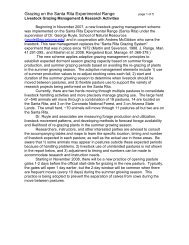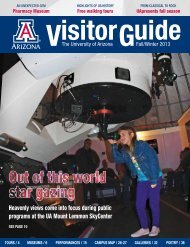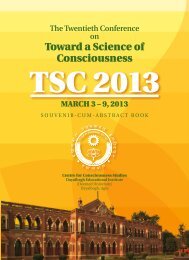CONSCIOUSNESS
Download - Center for Consciousness Studies - University of Arizona
Download - Center for Consciousness Studies - University of Arizona
- No tags were found...
Create successful ePaper yourself
Turn your PDF publications into a flip-book with our unique Google optimized e-Paper software.
222 6. Culture and the Humanities<br />
History, Kentucky Inventory of Mindfulness Skills, Mindful Attention Awareness during<br />
Video Game Play Scale, Immersive Tendency Questionnaire, and Presence Questionnaire.<br />
Only those who reported that traditionally hard core games (i.e., first person shooter, strategy,<br />
action, adventure, and role playing) were their favorite type were included in the subsequent<br />
factor analysis. Only 77 of these played a game prior to filling out the surveys. For these 77<br />
individuals, most of whom were male (n=57), a factor analyses was computed based on scale<br />
and subscale scores and items including gender. These variables were entered into a principle<br />
component factor analysis and five factors emerged. The first factor offers support for the<br />
primary hypothesis. That is, the younger they were when they began playing and the more<br />
presence they felt while playing a recent game were associated with a tendency to experience<br />
immersion and with three mindfulness scores from the Kentucky Mindfulness scale and one<br />
from the video game mindfulness scale. The other factors further illuminated this relationship.<br />
In this preliminary inquiry we found some support for the hypothesized relationship between<br />
game play (history and presence) and mindfulness attenuated by a tendency to become absorbed<br />
(immersion). When gender entered the equation then gaming was either negatively<br />
related to mindfulness (females) or not related to mindfulness (males). P6<br />
6.9 Ethics and legal studies<br />
341 Consciousness and Human Rights: Preservation and Protection of Consciousness-<br />
Based Technologies of Indigenous Peoples Lurleen Brinkman <br />
(American Indian and Indigenous, University of Tulsa College of Law, Lawrence, KS)<br />
Even as Western scholars are beginning to explore the ontology and science of consciousness,<br />
many consciousness-based technologies are in a critical state of existence throughout<br />
the world. That is, many indigenous and traditional knowledge systems, such as mind-body<br />
healing practices, in addition to critical languages, are on the brink of extinction. This presentation<br />
will address the issues of American Indian and other indigenous peoples of the<br />
world in their quest to preserve and protect their local, consciousness-based technologies.<br />
This presentation will also address the role of the Western researcher in the appropriate reflection<br />
of consciousness-based technologies in academia. The methodology for this presentation<br />
will include critical analysis, comparative analysis, and case studies, and will conclude with<br />
a discussion on the guidelines (as they relate to consciousness studies in academia) from the<br />
2007 U.N. Declaration on the Rights of Indigenous Peoples. P6<br />
342 Key Bioethical Questions at the Cusp of Our Assuming the Governance of<br />
Evolution Timothy Dolan (Public Administration,<br />
The Catholic University of Korea, Bucheon, Gyonggi Do Korea, Republic of Korea)<br />
A theme review of the 58 principle articles published in The Journal of Bioethics (AJB)<br />
was conducted for content pertaining to genetic policy. The initial review found some references<br />
with one special issue with specific focus on individual access to genetic testing. Many<br />
deal with popular concerns around the seemingly perennial question of the status of human<br />
fetuses in stem cell research and cloning. Other articles are more prosaic ranging from moral<br />
questions over the development and use of performance-enhancing technologies for soldiers<br />
in the military to the emergence of nanotechnology as a legitimate concern for bioethicists. If<br />
this topical inventory is at all representative of the field, bioethicists have indeed at least begun<br />
to wrestle with this very significant emerging issue while maintaining a focus on those perennial<br />
ones. A further analytical breakdown of governance themes indicates the focus clustering<br />
around the following: 4 articles on personal control of genetic information; 2 of which also<br />
spoke to governmental policy on this dimension) 7 articles on government policy primacy<br />
over genetic innovation (3 focusing on shared governance with individual control over a:<br />
personal genetic information (2) and b: corporate involvement (1) 3 articles on corporate policies<br />
governing genetic products (1 of which seeing shared government policy formation and<br />
regulation on the issue of monopoly patent rights) 1 article on physician primacy on decisions<br />
to use biotech in the treatment of patients. If this snapshot actually represents the distribution<br />
of foci among bioethicists, then it would suggest that the emphases are somewhat misplaced.







